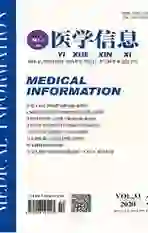静脉用药不合理使用情况及原因分析
2020-04-07顾福莉徐涑珅石昌国
顾福莉 徐涑珅 石昌国
摘要:目的 分析静脉用药不合理使用情况及原因,并提出针对性的干预方法,以提升临床静脉用药的合理和安全性。方法 回顾分析2018年1月~2019年6月我院119例静脉用药不合理患者的临床资料,分析静脉用药不合理原因,总结针对性的干预方法。结果 119例静脉用药不合理,其中药物之间配伍不当41例,占33.12%;输液溶剂不当22例,占18.03%;给药途径不当4例,占3.27%;给药剂量不当18例,占14.75%;给药浓度不当19例,占15.57%;给药頻次不当15例,占12.29%;119例患者中出现头晕5例,恶心呕吐6例,食欲不振9例,皮疹4例,不良反应发生率为20.16%(24/119),均未给予特殊处理,停药后自行缓解消失。结论 加强干预静脉用药不合理使用情况,明确不合理使用原因,并给予针对性干预,有助于减少临床静脉用药不合理现象,降低临床不良反应发生率。
关键词:静脉;合理用药;输液
中图分类号:R96 文献标识码:A DOI:10.3969/j.issn.1006-1959.2020.02.047
文章编号:1006-1959(2020)02-0153-02
Abstract:Objective To analyze the unreasonable use of intravenous medications and their causes, and propose targeted intervention methods to improve the rationality and safety of clinical intravenous medications. Methods The clinical data of 119 patients with unreasonable intravenous medication in our hospital from January 2018 to June 2019 were retrospectively analyzed, the causes of unreasonable intravenous medication were analyzed, and targeted intervention methods were summarized.Results 119 cases of intravenous medication were unreasonable, including 41 cases of improper compatibility of drugs, accounting for 33.12%; 22 cases of improper infusion solvents, accounting for 18.03%; 4 cases of improper administration, accounting for 3.27%; 18 cases of improper dosage, accounting for 14.75 %; Improper administration concentration in 19 cases, accounting for 15.57%; improper administration frequency in 15 cases, accounting for 12.29%;in 119 patients, dizziness occurred in 5 cases, nausea and vomiting in 6 cases, loss of appetite in 9 cases, and rash in 4 cases. The incidence of adverse reactions was 20.16%, all of which were not given special treatment and disappeared after stopping treatment.Conclusion Strengthening the intervention of irrational use of intravenous drugs, clarifying the reasons for irrational use, and giving targeted interventions can help reduce the irrational clinical use of intravenous drugs and reduce the incidence of clinical adverse reactions.
Key words:Intravenous;Rational drug use;Infusion
静脉用药是临床治疗疾病的重要手段。随着医药科技的快速发展,临床可静脉使用的药品种类越来越多,但不合理使用情况仍存在,严重影响疾病的有效治疗及用药安全。静脉用药药液会直接进入血管,准确科学调配静脉药物,是确保静脉用药合理的关键。目前有关静脉用药不合理现象的研究较多,但是关于静脉用药不合理原因和干预方法研究较少,且研究结论存在争议。本研究结合2018年1月~2019年6月我院119例静脉用药不合理患者的临床资料,分析静脉用药不合理原因,总结针对性的干预方法,以期为提高临床静脉合理用药水平提供一定的参考,现报道如下。
